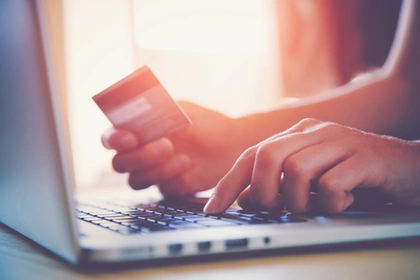Which bills can you pay with a credit card?
Many types of bills can be paid with a credit card, though some make more sense to use a card for than others. Here’s a list of common bills you can pay:
- Rent – Not all landlords accept credit cards, so check first. If they don't, then you may be able to use a third-party service to pay your rent using a credit card, but these usually come with high fees.
- Car loans – Some providers allow this, but options can be limited.
- Insurance – Car, home, or other policies may accept credit cards.
- Taxes – Some platforms allow card payments but may charge fees. For example, you can’t pay HMRC using a credit card, but you may be able to use one for your council tax.
- Utilities and services – Electricity, gas, phone, broadband, and water bills can usually be paid by credit card.
- Subscriptions – Services like Netflix, Spotify, gym memberships, and similar tend to accept credit card payments.
Before proceeding, make sure that you aren’t going to put yourself in financial difficulty. If you don’t have the disposable cash to pay for your bills, it’s always best to contact the company you owe to let them know. They might be able to do something to help, like set up a reduced repayment plan, for example.
If you are in financial difficulty, consider getting free debt advice from organisations like StepChange and Citizens Advice.
Also, remember to check if any additional charges apply for paying by credit card. You will need to pay interest on your credit card balance, unless you clear it in full each month.
Can you pay your tax bill with a credit card?
Not usually. HMRC no longer accepts personal credit card payments for tax bills, including Self Assessment. This change was made in 2018 to meet EU laws.
What are your options?
- Use a business credit card: HMRC still accepts payments from corporate credit cards, but they also come with a fee. This option is only available if the tax is related to your business.
- Third-party services: Some companies offer to pay HMRC on your behalf in exchange for a credit card payment. These services charge a fee, typically between 1.5%–2.5%, so it’s worth comparing the cost before going ahead. HMRC does not endorse or partner with these services.
Things to consider:
- Fees can add up: Always weigh up the cost of using a credit card versus the benefit, especially if you’re also paying interest on the balance.
- Debt risk: If you can’t repay your credit card in full, the interest could make your tax bill more expensive in the long run.
- Safer alternatives: If you’re struggling to pay your tax bill, it’s worth contacting HMRC to ask about a Time to Pay arrangement. This lets you spread the cost over manageable monthly payments.
How do I pay bills with a credit card?
Paying bills with your credit card is straightforward. Just follow these steps:
- Choose your credit card provider
Select your card type (e.g., Visa, MasterCard, American Express). If the provider isn’t listed, the biller doesn’t accept it. - Enter your card details
Provide the following information: Name on the card, your 16-digit card number, expiry date, and the 3-digit security code (CVV) on the back of the card. - Enter your billing address
Use the billing address linked to your credit card. - Confirm the payment
Once everything is set, confirm the payment. The biller will handle the rest.
Can you set up recurring bill payments on a credit card?
Yes, you can set up recurring payments (also known as continuous payment authority) using your credit card. This is useful for bills like subscriptions, insurance, and utilities.
How to set it up:
- Select “recurring payment” or “continuous payment” when you’re entering your card details.
- Confirm that the payment will be made automatically each billing cycle.
What to watch out for:
- Keep an eye on your balance to avoid going over your credit limit.
- Make sure you have enough money in your bank account to repay the credit card bill each month to avoid interest.
- Cancel payments directly with the bill provider if you no longer need the service.
Advantages of paying bills with a credit card
- Top up your credit score. Using your credit card regularly and responsibly can help build your credit history, boosting your credit score over time. You can do this by always paying on time and keeping well below your credit limit.
- Earn rewards. If your credit card offers cashback, air miles, or other rewards, using it for bills can help you earn extra perks. Just make sure you can repay the balance in full to avoid interest.
- Simplify money management. Paying bills through your credit card can often means fewer statements to check, making it potentially easier to track some of your outgoings.
- Cover short-term cash flow gaps. If cash is tight before payday, using your credit card can act as a short-term solution to keep bills paid on time. But be careful with interest charges.
Disadvantages of paying bills with a credit card
- Processing fees. Some providers charge a fee for each credit card transaction, increasing your bill.
- Interest charges. If you don’t pay off your card balance in full, you’ll incur interest charges.
- Credit score risks. Missing a payment or maxing out your credit limit can damage your credit score.
- Risk of overspending. Automatic payments or using your card too often can lead to debt.
How does paying bills with a credit card affect your credit score?
Paying bills with your credit card can affect your credit score in both positive and negative ways:
Positive impact:
- Regular, on-time payments: Consistently paying your credit card bills on time demonstrates to lenders that you are reliable and responsible, which can positively impact your credit score.
- A mix of credit types: Using your credit card to pay different types of bills (e.g., utilities, subscriptions) can contribute to a diverse credit mix. This diversity shows lenders that you can manage various financial obligations responsibly, which can improve your credit score.
Negative impact:
- Late payments will damage your score and result in penalties that stay on your credit report for six years. This can lower your chances of getting accepted for credit in the future.
- High credit utilisation (using too much of your available credit) may lower your score. Avoid maxing out your card by keeping your balance low.
Tip: Pay your credit card balance in full every month to avoid interest and build a strong credit profile.
Is it a good idea to pay bills with a credit card?
Paying bills with a credit card can work well if you’re able to pay off the balance in full each month, or if your card offers rewards that make it worthwhile. It can also be helpful if you need a little extra time to manage your cash flow.
However, using your credit card to pay for bills when you don't have enough disposable cash might not be the best idea, as it can lead to further financial difficulties.
Additionally, it might not be the best choice if you’re close to your credit limit, if your bill provider charges high fees for credit card payments, or if you're unable to pay off the balance in full, as this could lead to interest charges.
Ocean Credit Card
See if it's a YES before you apply
- Up to £8,000 credit limit
- Checking won't affect your credit score
- Get a response in 60 seconds
Intelligent Lending Ltd (credit broker). Capital One is the exclusive lender.

Disclaimer: We make every effort to ensure content is correct when published. Information on this website doesn't constitute financial advice, and we aren't responsible for the content of any external sites.






